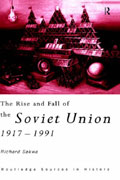Author's response
| Book: | The Rise and Fall of the Soviet Union 1917–1991Richard SakwaRoutledge ISBN: 0415122899; 1999 |
| Reviewer: | Peter WaldronUniversity of Sunderland |
Dr Waldron has written one of his typically acute and supportive reviews. There is little in the review that I would wish to dispute. Rather, I would like to take this opportunity to comment on some of the issues that Dr Waldron raises in his discussion of the book.
First, the question of periodisation. He is right to note that The Rise and Fall of the Soviet Union uses conventional periodisation. I am well aware that the choice of periods is itself indicative of the deeper structure of a historical process, and that a failure to problematise the issue can obscure profound methodological questions. In tackling this book I had initially thought about employing a thematic approach, discussing issues such as political development, ideological evolution, economic transformation and foreign policy in chapters of their own. This immediately raised the problem of how to connect one strand with all the others in any given period. On reflection, it seemed to me that what was gained in longitudinal coherence was lost in horizontal depth. There then arose the question of what periodisation to employ. The history of the Soviet Union is full of paradoxes, and one of these is that the radical republicanism of the communist system should have replicated so intensely the monarchical features of the social order that they had so violently overthrown. Ultimately, there appeared to be no coherent rationale to abandon the dates associated with the various leaders of the USSR. The quasi-monarchical features of Soviet rule reflected in conventional periodisation itself tells us a lot about the system.
Second, the emphasis on domestic politics again caused me no small concern. In books such as this the problem of length is always a pressing one, and the series editor (Professor David Welch) and the editors at Routledge showed considerable understanding (and indeed indulgence) in allowing rather narrow word limits to be exceeded to allow full scope for the subject matter to develop. We indeed toyed with the idea of a two-volume work, with one on domestic and one on international affairs, but we felt that this would undermine the coherence of the whole. We did try to squeeze in as much as possible of the international context, and as Dr Waldron notes, for the wartime years there is considerably more than elsewhere. I may say on a personal note that as I worked on the texts I became ever more fascinated by the period 1939–41, above all from the signing of the Nazi-Soviet Pact to the German invasion in June 1941. The recent work by Gabriel Gorodetsky throws considerable light on the period, yet there are all sorts of threads that could have been pursued, and each one could have ended up as a book in its own right. For example, the Soviet invasion of Poland on 17 September 1939 and its aftermath, above all its effect on the evolution of Soviet policy would be a fascinating topic, encompassing the decision to liquidate the Polish reserve officers at Katyn and elsewhere.
Third, the emphasis on politics and the rather limited reflection of these policies on society. To this I can only plead guilty. One of the most enjoyable aspects of preparing a book of sources like this is the ability to forge out of mostly known materials a new synthesis that itself creates an original picture. The dialectic between power ('vlast') and society is one that could, and probably should, have been pursued more systematically. This would not necessarily have meant adopting the positions of the 'revisionist' social historians of the Soviet experience; but it would have meant seeking out more memoirs and reminiscences showing the impact of high politics on people and, now that the archives are mostly open, the effect of popular moods on the leadership. The aim, if I ever had to do such a book again, would be to achieve the effect of a symphony orchestra, with all sorts of instruments each contributing to the overall composition.
Fourth, and this is a point suggested by Dr Waldron at several points and one that follows from the point above, is the question of 'experience'. This could well have been a theoretical hook on which far more weight could have been hung. The connection of lived experience at a time of the great 'experiment' in social and political planning could have provided a unifying theme for the whole work. One of my great regrets in doing the book is that I was never able to find the original of a comment attributed to Dr Pavlov (he of dog fame) in 1919, commenting on the Bolshevik attempt to turn the world upside down: 'At least in psychology we first experiment on animals'. The Bolshevik experience was one of humanity's greatest social experiments; and it was also one of humanity's greatest failures (whatever positive may be said about Soviet rule): the system ultimately proved unsustainable and irreproducible. The roots of this failure could have been traced throughout its history and prehistory. To an extent I did try to do this in focusing on political ideas, beginning with Marx, but the elements that later led to failure could have been identified more explicitly.
There are plenty of other issues that could be commented on, but I will restrict myself to these. I am grateful to Dr Waldron for his perceptive review, and above all to have had the opportunity to think aloud about some of the problems and issues raised in preparing the book on the rise and fall of the Soviet Union.
April 2001

